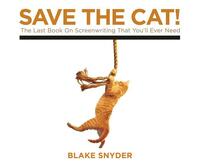You need to sign in or sign up before continuing.
Take a photo of a barcode or cover
Look, a lot of what this dude said was helpful...but he's so insufferably arrogant that it's hard to get through a lot of this book.
If you can deal with terrible attempts at humor and some random guy ranting about how he sold a movie to Disney (never mentioning that it has a whopping 7% on Rotten Tomatoes and features a scene where a thirty-year-old woman kisses an eleven-year-old boy and tells him to "find her in a few years"), then you'll probably find this book a lot more helpful than I did.
Again, he had some valid advice and tips that I'll probably employ in the future, but there's a reason that the cat on the cover is orange, and I wish this book had been written by literally any other screenwriter.
If you can deal with terrible attempts at humor and some random guy ranting about how he sold a movie to Disney (never mentioning that it has a whopping 7% on Rotten Tomatoes and features a scene where a thirty-year-old woman kisses an eleven-year-old boy and tells him to "find her in a few years"), then you'll probably find this book a lot more helpful than I did.
Again, he had some valid advice and tips that I'll probably employ in the future, but there's a reason that the cat on the cover is orange, and I wish this book had been written by literally any other screenwriter.
At first I was put off by Snyder's pushy tone, and at times his diction is so idiosyncratic that it took me out of what I was reading and made me wonder why-- for example, bullhead as a noun. WTF.
But by the middle of the book or so, I felt like I was jamming along pretty well. I'm not all that interested in selling my screenplays, but I think he has some really good ideas-- his sense of the kinds of stories was good, I liked his ways to get certain things done-- the pope in the pool and all that, and also the section on common problems in scripts. It's a solid little book on writing a particular kind of narrative.
And though I don't think he had it first-- in fact, he talks about where he got it-- I liked the detail of what he does with the corkboard and the filecards well enough that I might invest in both for the class I'm teaching.
But by the middle of the book or so, I felt like I was jamming along pretty well. I'm not all that interested in selling my screenplays, but I think he has some really good ideas-- his sense of the kinds of stories was good, I liked his ways to get certain things done-- the pope in the pool and all that, and also the section on common problems in scripts. It's a solid little book on writing a particular kind of narrative.
And though I don't think he had it first-- in fact, he talks about where he got it-- I liked the detail of what he does with the corkboard and the filecards well enough that I might invest in both for the class I'm teaching.
challenging
hopeful
inspiring
medium-paced
Extremely informative! I would recommend this book for anyone looking to write a screenplay.
This book came highly recommended by people interested in screenwriting and storytelling, and I was disappointed. It is not very well written, and it is not a good book on writing in general. I can't say how it compares to other screenwriting books, but I still wouldn't recommend it. Surely there are better screenwriting books out there.
Although I don't aspire to be a screenwriter, I found that this book offered great insights into storytelling in general. There's much here that I think could be applied to the writing of a novel, or even a short story. I was particularly interested in finding out more about the story "beats" Snyder is known for, and the explanations were very revealing.
The style is conversational and casual, but there's a lot of information contained within. The author uses many examples from well-known movies to illustrate his points (which made me want to go and watch the movies, in many cases!).
As a writer, I think it's always good to find new ways of thinking about stories and storytelling, and understanding what we're trying to do when we tell a story. This book has certainly made me think about storytelling from a different and valuable perspective. Highly recommended for writers of all stripes.
The style is conversational and casual, but there's a lot of information contained within. The author uses many examples from well-known movies to illustrate his points (which made me want to go and watch the movies, in many cases!).
As a writer, I think it's always good to find new ways of thinking about stories and storytelling, and understanding what we're trying to do when we tell a story. This book has certainly made me think about storytelling from a different and valuable perspective. Highly recommended for writers of all stripes.
Not only the best of the screenwriting books I've read, but contains information I actually USE and refer to when writing.
I can think of no better endorsement than that.
But when you're done, read McKee's STORY, just so you don't think it's all about the money...even though it is.
I can think of no better endorsement than that.
But when you're done, read McKee's STORY, just so you don't think it's all about the money...even though it is.
Often hailed as the Holy Grail of screenwriting (and just as often by extension, storytelling of any kind), Save the Cat! doesn't exactly live up to its promise. Blake Snyder has produced a short, punchy treatise on the laws by which he writes screenplays. And there is some compelling advice to be had here, especially concerning how to structure stories and how to keep in mind audience payoffs. However, the approach is so prescribed, so artificial, and so soulless, that yeah, Snyder might have made himself a few million dollars at this, but he's also pretty emblematic of what any serious filmgoer points to when they use the adjective "Hollywood" negatively. He has written a bunch of scripts for things that were never made, and the ones that were turned out to be awful, awful movies. He is annoying self-congratulatory, and he brags more than once about the time he worked with Spielberg...on a movie that never got made.
What's worse is that he sometimes pauses to fire a shot across the bow at movies that violate his rules, and which he clearly does not like, personally. In more than one case, he goes after movies that still were huge box office successes, and isn't that what his method is really about? It sure as hell isn't about creating art or expanding the limits of a medium or testing a new genre. It's about cranking out reliably entertaining stories for folks who like to be reliably entertained. So why should he care that Movie A was a success and yet doesn't fall into his 15-step process? Oh, right. Because it's not about making great stories. It's not even about making successful ones. It's about him.
Ultimately, all you really need from this book can be found for free online: https://www.savannahgilbo.com/blog/plotting-save-the-cat
What's worse is that he sometimes pauses to fire a shot across the bow at movies that violate his rules, and which he clearly does not like, personally. In more than one case, he goes after movies that still were huge box office successes, and isn't that what his method is really about? It sure as hell isn't about creating art or expanding the limits of a medium or testing a new genre. It's about cranking out reliably entertaining stories for folks who like to be reliably entertained. So why should he care that Movie A was a success and yet doesn't fall into his 15-step process? Oh, right. Because it's not about making great stories. It's not even about making successful ones. It's about him.
Ultimately, all you really need from this book can be found for free online: https://www.savannahgilbo.com/blog/plotting-save-the-cat
A lot of good points (and gave me the inspiration for a new story) but not quite the be-all, end-all of general writing that others had told me it was.
It made my understanding of movies bigger, and there are few tips I could take and translate into Novel writing, but all in all, I liked the shortness of the book. The Story Grid is more useful for novelists.




